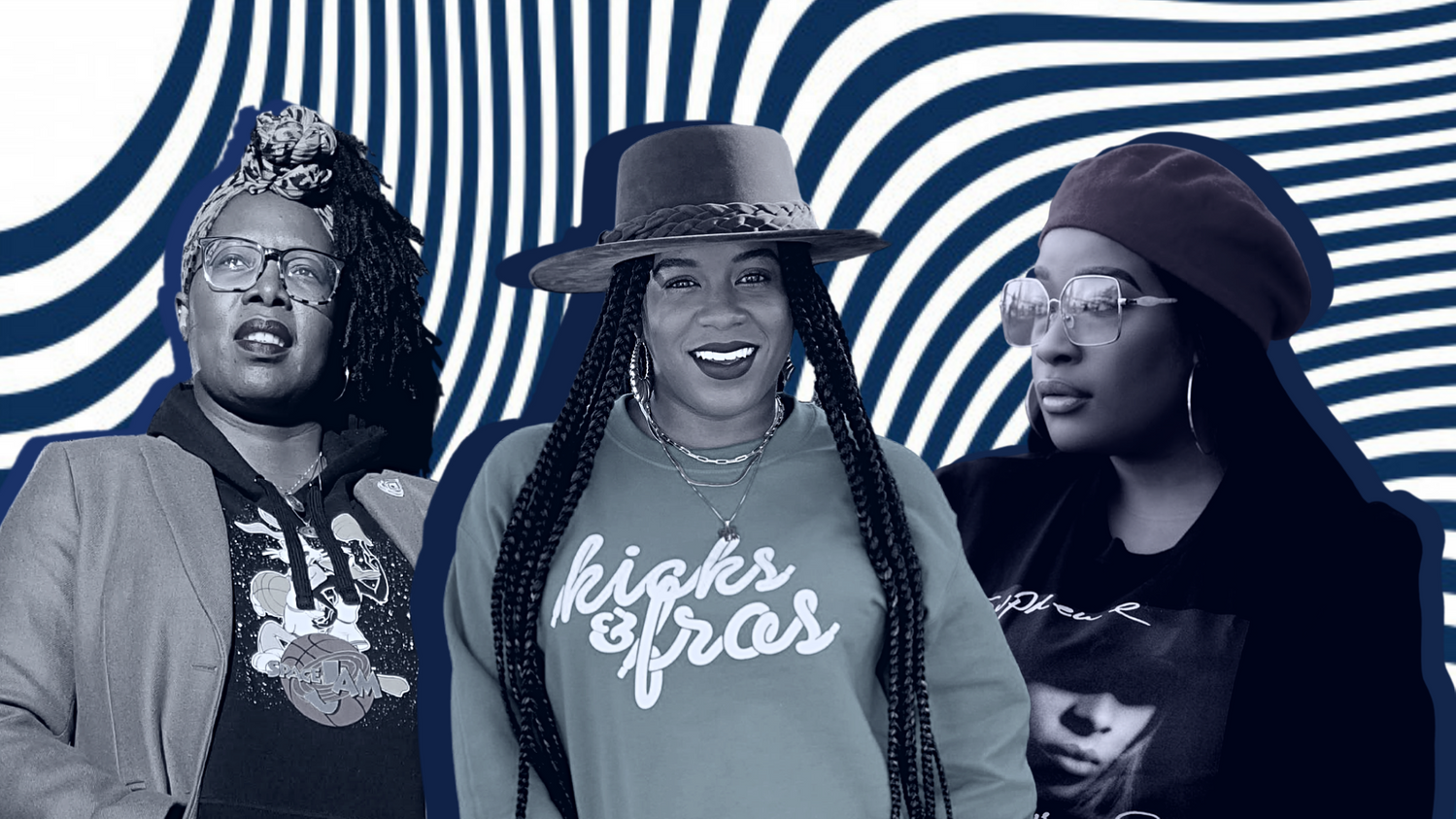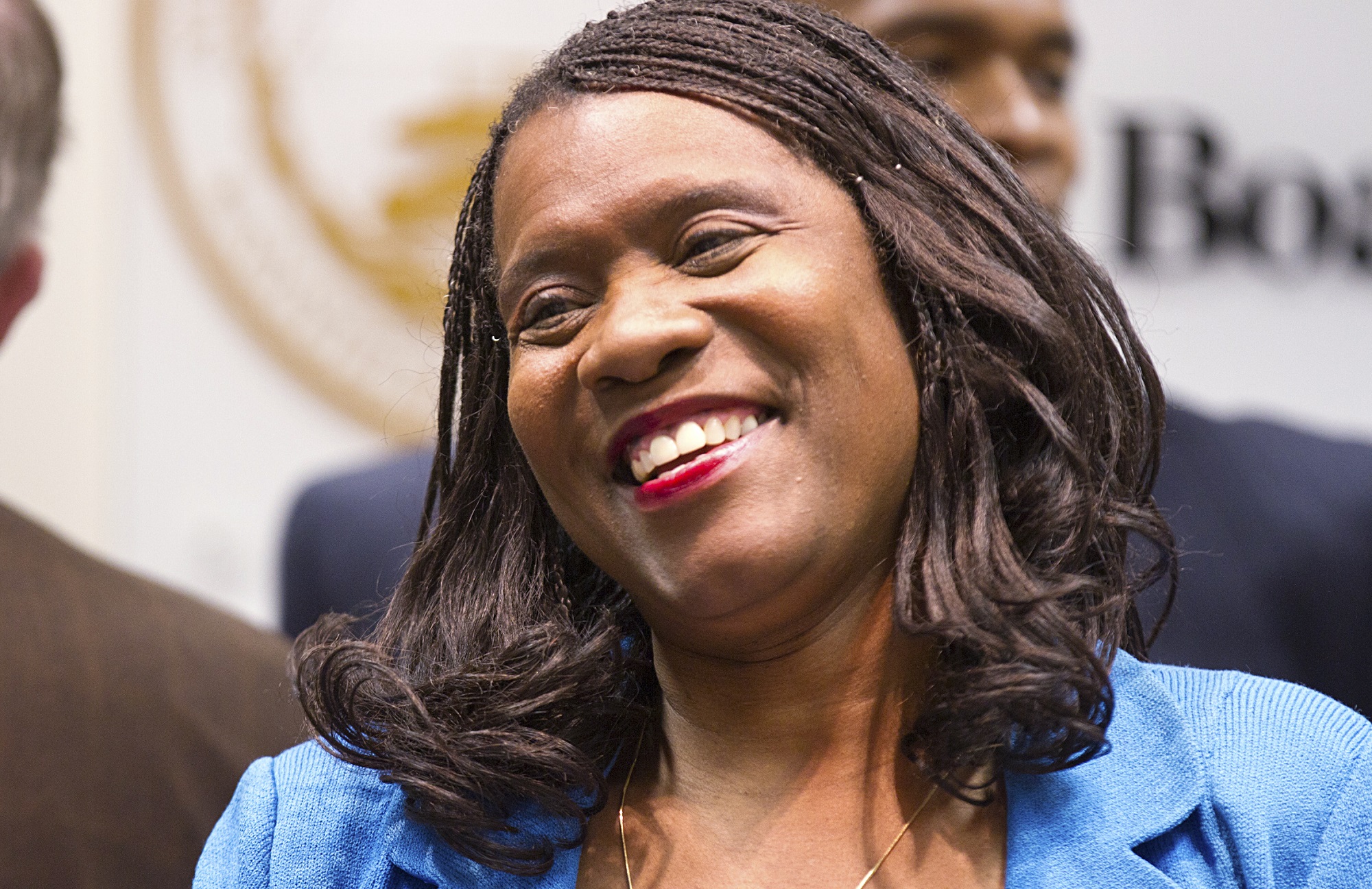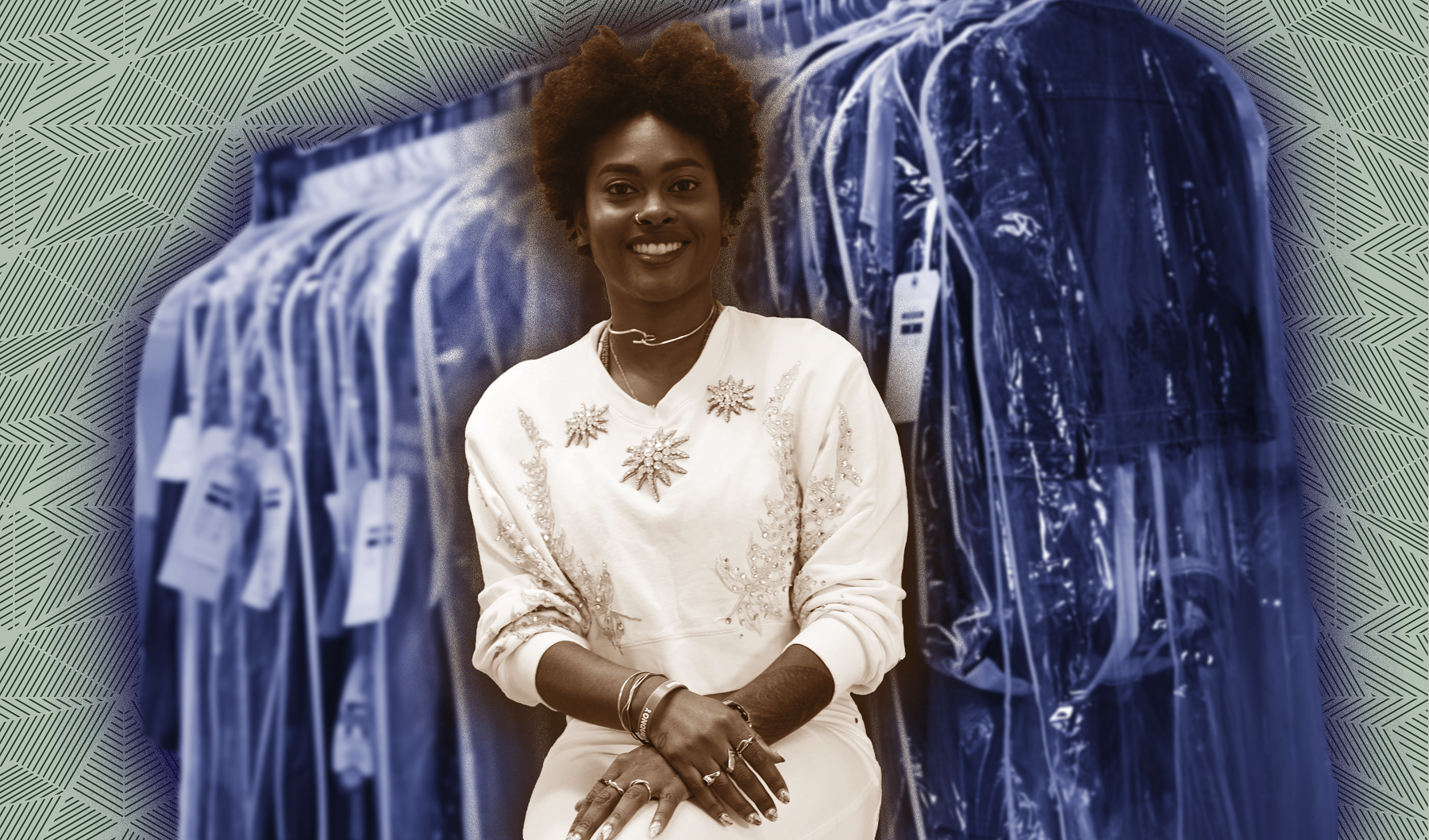Individual expression isn’t complete without creative looks to match, and the concept of streetwear started back in the late 70s when hip-hop began to emerge. It wasn’t called streetwear at the time, but it was clear that the burgeoning rappers, b-boys and girls, and graffiti artists in the Bronx had a unique sense of style to match their rhymes, flows and dances. Run DMC made Adidas cool by immortalizing the sneakers in song; Dapper Dan pioneered high style concepts, showing that hip-hop was a viable aesthetic when it came to fashion; Misa Hylton-Brim engineered iconic looks for multiple artists from Mary J. Blige to Diddy to Lil’ Kim. Many of these people are finally starting to get their props as fashion pioneers, but there’s still a long way to go when it comes to Black representation in streetwear—especially for women.
These days, streetwear is a worldwide concept with everyone from budget retailers to luxury brands trying to get in on the fun. But when you look at the ads or the people behind the scenes, not many of them look like the actual arbiters of the culture. Thankfully, that is changing. For some people representation is more than a buzzword, and they are utilizing social media to establish the voices of the underrepresented. Their individual stories vary, but they are brought together by a shared love of one thing: streetwear fashion. Here, we celebrate some of those voices.
Kicks & Fros
Melissa Carnegie, Chief Kicks Officer
Melissa Carnegie is the CKO — that’s Chief Kicks Officer — of Kicks & Fros. Carnegie is from Camden, South Carolina, which she describes as a “small town where everyone knows everyone.” She developed a passion for fashion at a young age, modeling outfits for family members. Her parents were into sneakers, and that love naturally extended to her and her brother. “My mom liked to keep it girly with classics like Reeboks and AirMax,” Carnegie tells AURN. “My dad started to teach us how to keep our kicks clean with soap and a toothbrush. He also had sneakers stacked high to the ceiling, so I was introduced early on in life.”
In high school, Carnegie began working part time and buying sneakers on her own. By then she was all about Jordan’s and Airforce 1’s and got serious about collecting in about 2003. Fast forward to 2017—Carnegie began to conceptualize Kicks & Fros but told herself she didn’t have time due to working a fulltime job. Yet, after realizing that the world needed more spaces for Black women sneakerheads, she went full steam ahead. “I wanted to create a community for us, by us,” says Carnegie, “where I could share inspo, sneaker news, introduce the community to other sneaker collectors, and provide dope merch options for women to express themselves while rocking their kicks.”

Today, Kicks & Fros has blossomed from its social media component to an online store with men and women rocking Kicks & Fros t-shirts, sweatshirts, bucket hats and the highly coveted “Sneaker Money” pouch. Moving forward, Carnegie plans to continue creating spaces for women in the industry by hosting events, conferences and eventually becoming a household brand.
“To change the narrative, we need more women in the rooms,” says Carnegie. “We are starting to see more collaborations with sneaker brands and female designers and creators, but more could be done. We just have to continue to help each other by speaking up for women sneaker collectors in meetings, letting us create content, and hearing as well as sharing our stories. I think brands like Nike and retailers like Footlocker are finally starting to see that women know just as much about sneakers and wear them just as much as men.”
If I Can’t Wear Snkrs
Christina Kenan, founder
If you’re looking for the scoop on the hottest drops, then look no further than If I Can’t Wear Snkrs. Founder Christina Kenan grew up in the 90s in Prince George’s County, Maryland, where she went to schools that had strict uniform policies. Even though aesthetic expression wasn’t allowed, she was constantly inspired by the stylings displayed on TV shows like Martin and The Fresh Prince of Bel-Air.
“These shows opened my eyes to streetwear and sneaker,” says Kenan. “You always saw Will and Martin with the freshest Jordan’s out, but my mom wasn’t a huge fan of Michael Jordan and refused to buy me what were considered expensive sneakers. I cannot blame her, honestly. This was during the time where people were getting robbed and killed over sneakers.”
Eventually, Kenan took a liking to a pair of Air Max Plus after being introduced by a friend. She begged her mother for a pair until she finally said yes. The pair Kenan wanted was sold out, so she ended up getting Air Max Plus II (which were similar). She wore them to school with pride, got lots of compliments, and the rest is history. “From that day on in 1999, I was gone in the paint,” Kanen says.

In 2019, Kenan was on the hunt for the highly coveted Melody Ehsani Air Jordan 1 Mid Fearless drop. They should have been easy to obtain, but bots. This cheat has been plaguing the sneaker industry for years; resellers deploy bots to buy as many pairs as possible, and then, when supply is scarce, they triple the price—making it hard to purchase at retail. Kenan’s first attempt didn’t work out, but her search for her holy grail led her on an unexpected journey where she ended up developing a relationship with Melody Ehsani herself.
“I’ve been a Melody Ehsani fan for over 10 years, [since] back in her Karmaloop days,” says Kenan, “and when I saw those shoes, I knew I had to have them. They originally released on her website on November 8, 2019, and the bots immediately snatched the entire stock. I was devastated and started tweeting her. Shortly thereafter, she announced that she and her team planned on cancelling all of the orders and manually sending invoices.”
“So many people were after those shoes, so I knew I had no chance. Yet I kept tweeting her about how long I had been a fan of hers. I even tweeted her a picture of my first Melody Ehsani jewelry piece I ever bought…I was upset that whole day and eventually fell asleep. Later that night, I woke up, checked my phone and saw a tweet from her asking ‘What size do you need?’ and I freaked out.”
Kenan got the coveted pair of sneakers she was looking for, but she was also inspired by how Ehsani and her team worked hard to make sure the M.E. fanbase could get what they wanted with as little interference from bots as possible. Kenan kept in touch with Ehsani and her team, inspired to figure out a way to make sure other women on the hunt for fire could find their pieces. That’s how If I Can’t Wear Snkrs was born. Kenan is committed to putting in the research, so you don’t have to.
“I usually always start by checking well known sneaker store sites,” says Kenan, “like Footlocker, Finish Line, DTLR, Snipes, etc. I then check sites like SneakerNews and Drop Date for UK releases. After that I spend a few hours a day looking for leads on Instagram, Twitter, and Google. In the early days of my page, I would actually call stores for information, but that got old very quickly. After a few months of releases, I started compiling a huge list of sneaker websites and stores to check whenever a release would be coming out. You start picking up on patterns from these stores and websites and can usually gauge what stores will be carrying certain releases.”

If I Can’t Wear Snkrs is just getting started, but Kenan plans to continue growing her platform, so that post-COVID life can include in-person events and foster more connections—especially among women who don’t often get access to early news about new drops. “Sneaker culture derived from different Black [culture],” says Kenan, “but in comparison to Black men who dominate sneaker culture, Black women have historically and consistently been left out of important conversations within streetwear. This is especially true when it comes to sneaker culture. Jazerai Allen-Lord said it best: ‘There are so many different facets of women, particularly Black women, that we don’t ever get to see represented on a major stage.’”
“Black women are underrepresented and underrecognized in every aspect of the sneaker community—from not being in senior level positions, to the lack of Black designers, to the lack of Black female sneaker influencers and collaborators who are magnified on different popular sneaker platforms in comparison to their white or racially ambiguous counterparts. This has been a long-standing issue, but pioneers Vashtie Kola, Aleali May, and Jazerai Allen-Lord have and are continuing to pave the way for Black women. But we must continue their work by continuing to amplify the voices of Black women within the sneaker community.”
Note: If I Can’t Wear Snkrs is set to private for now until Kenan can move to a more exclusive space for the community she is building. However, friend requests are welcome.
Brown Girl Kicks
Traviata, Founder/SneakHer Lover

Traviata, founder of Brown Girl Kicks, has been a sneaker collector her entire life. However, like many other Black women in sneakers, she rarely saw faces that looked like hers, so she took matters into her own hands by recruiting two friends to launch Brown Girl Kicks.
“In the words of Nareashsa Willis of AVNU, ‘Ghetto Until Proven Fashionable’,” she tells AURN. “Unfortunately, a lot of what we do is viewed through a lens that doesn’t hold much value, so once those same things go mainstream, it’s easy to push us aside. To create balance, I feel we must bring it to the front of the class, and by that I mean getting the decision makers to see the value in what we bring to the table.”
Traviata brings up a good point, Black women have tremendous spending power. According to a Nielsen study conducted in 2017, Black women will be largely responsible for increasing Black spending power to $1.5 trillion by 2021.
“Just think about it,” says Traviata, “we not only buy for ourselves, we buy for our significant others, children and extended family members, but somehow we are always left out of the conversation. Black women are never cut checks, but our creativity and style are always being checked for. I mean, it’s not all about a monetary reward, but why wouldn’t you want to hear from the people who are major consumers of your product?”
Traviata takes pride in featuring diverse stylish women who are talented, creative and reclaiming spaces that they helped to define. “As Black women, we are not a monolith,” she says, “we are multidimensional, stylish, creative and talented beings, continuously fighting to exist in spaces that we’ve helped to define. Representation is so important, and that is exactly what we strive for at BGK.”
Thick Laces
Kurvy Katie and Essie Golden
Thick Laces was founded by influencers Kurvy Katie and Essie Golden, who are making sure that plus-size women in streetwear and sneakers get a say in the fashion game. Its community is fairly new but it’s not short on stylish women who are killing the game and continuing to set trends and inspire women with unconventional bodies who may feel left out of the conversation.
“It’s essential to showcase plus-size body types because we have been changing the game and not getting recognition for it,” says Kurvy Katie and Essie Golden in a joint statement to AURN. “[Brands] are inspired by us but not hiring us. They look for the same body type, skin color, and facial features for streetwear, put them in oversize clothing, and that is it.”
Kurvy Katie and Essie Golden took this frustration and made a platform that speaks to the representation they hope to see moving forward.
“Brands need to go out of their way to hire more women of color and allow them to flourish their creativity. We all know Black women move the culture,” says Thick Laces founders, who are also preparing to launch merchandise.
Get in on the fun by using #ThickLaces when you post photos in your drip.















